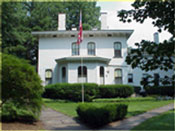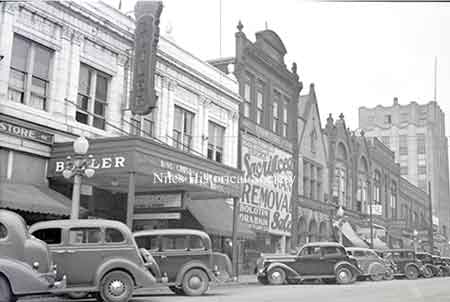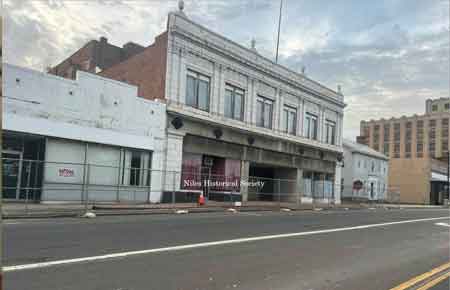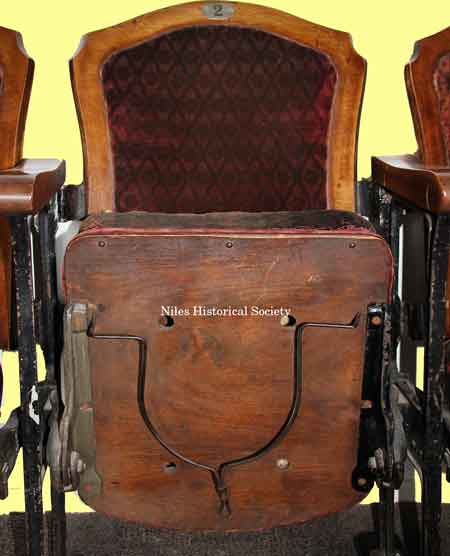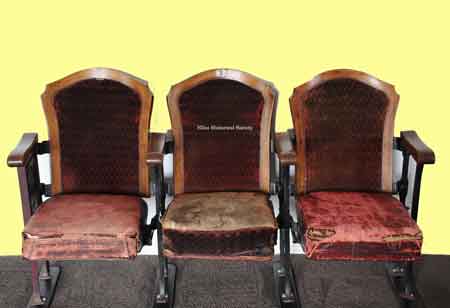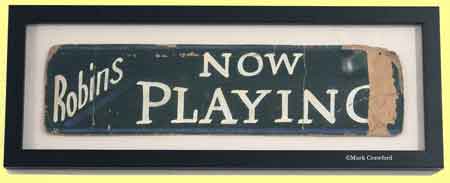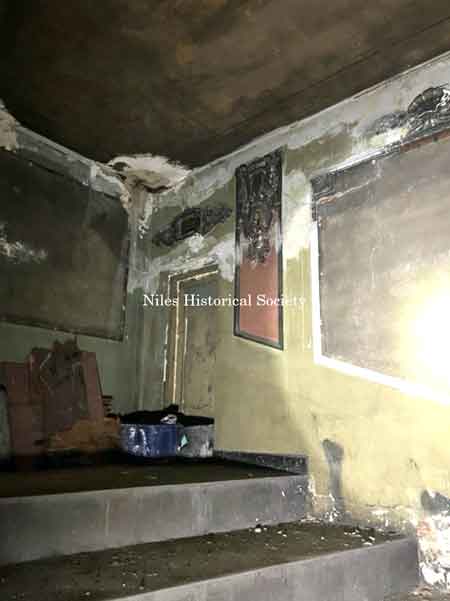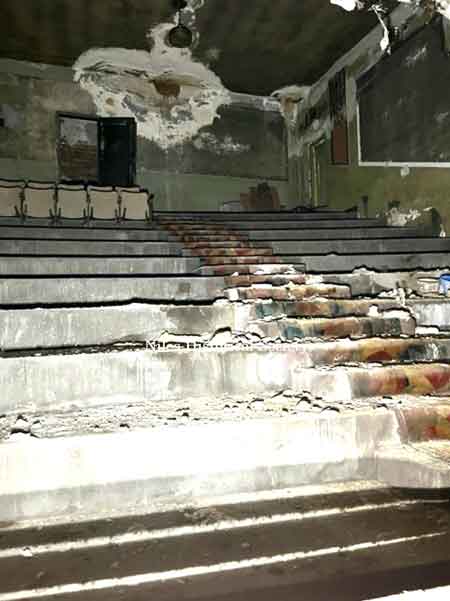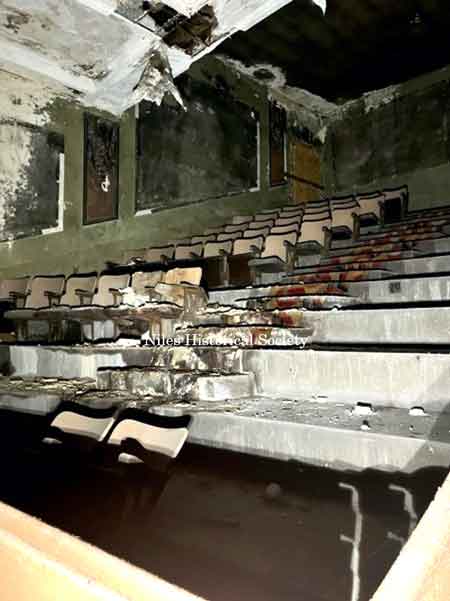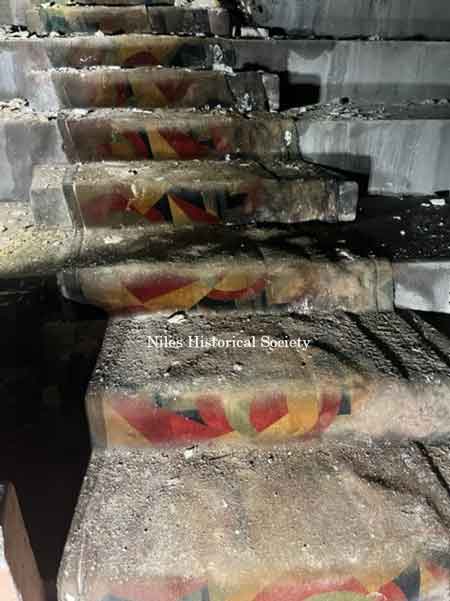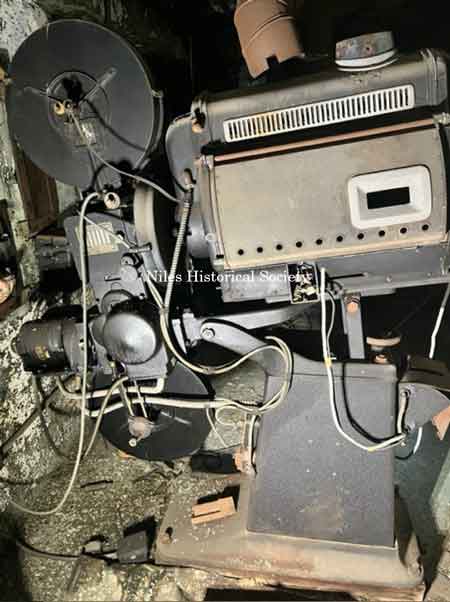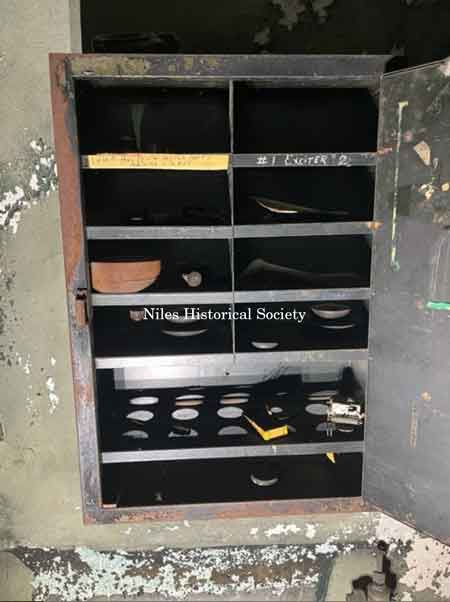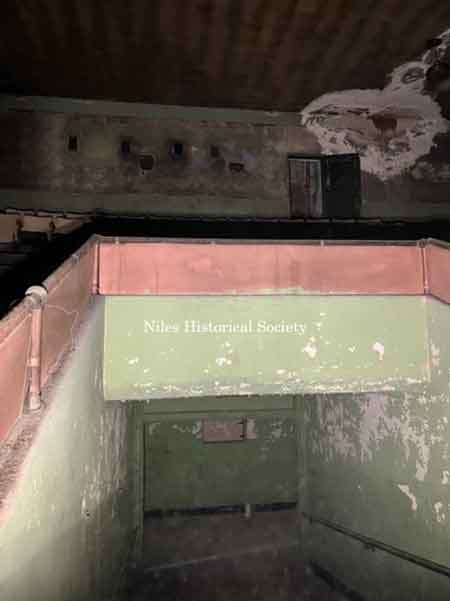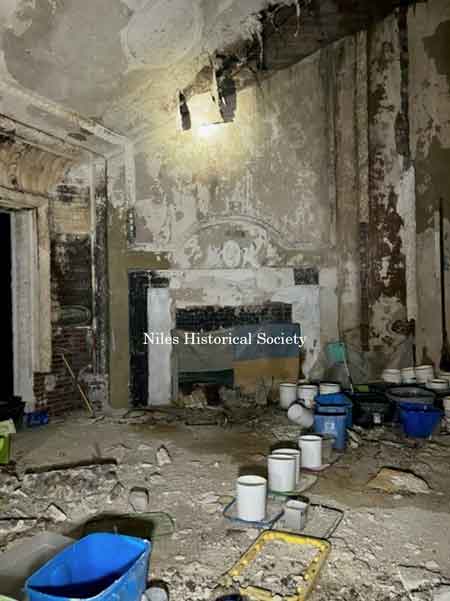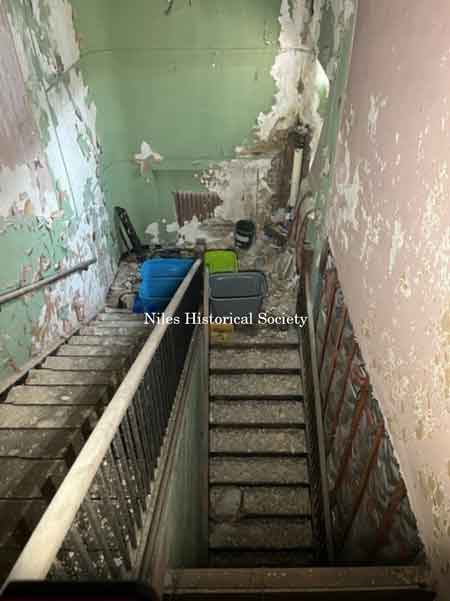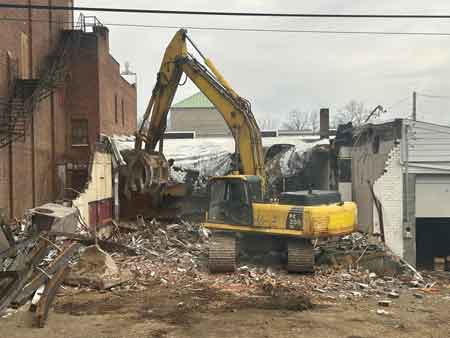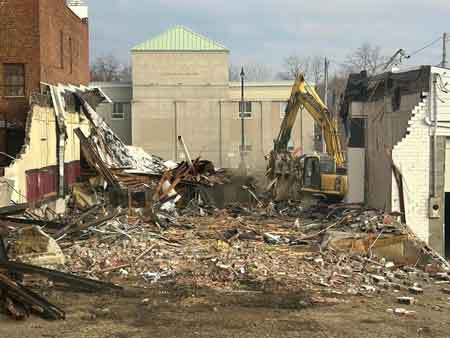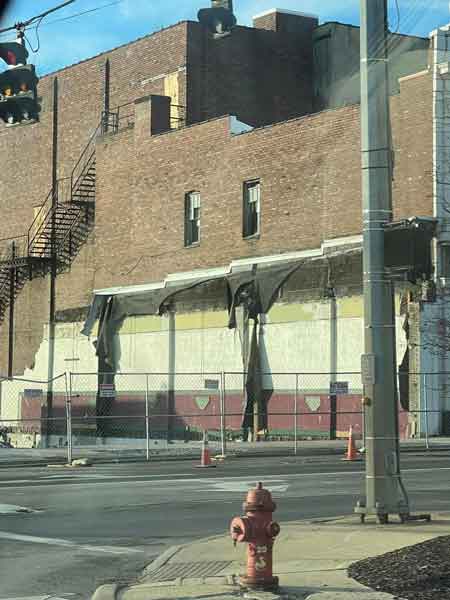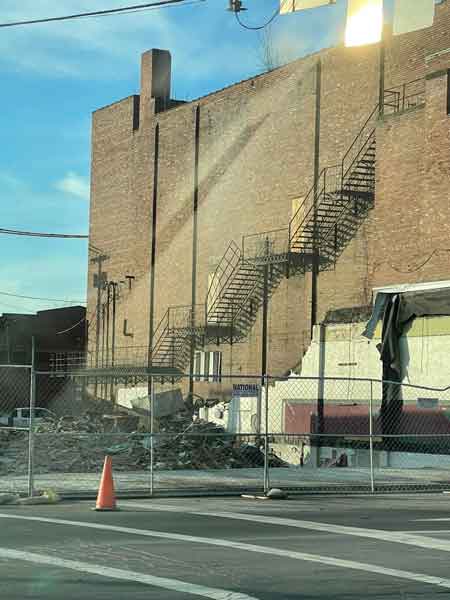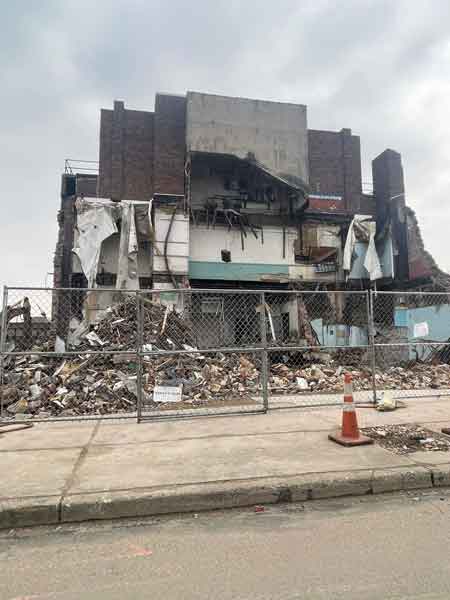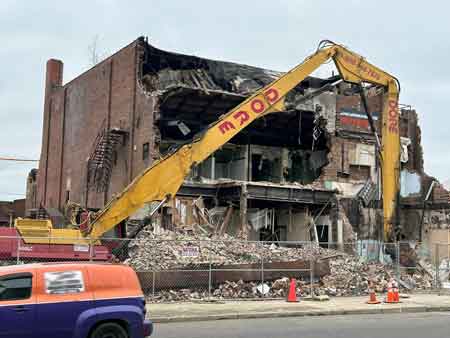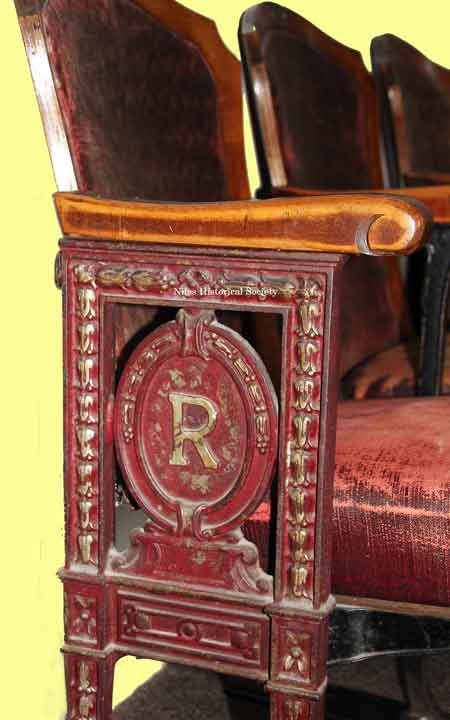
Side view of Robins Theatre end
seat with emblem of R for Robins. |
Robins
Theatre Rescue.
In 1974, the Robins Theater closed
for the final time. It seemed like it had been struggling for
the previous few years–possibly due the new Loews Theater
at the recently built Eastwood Mall. Most of downtown Niles was
being razed.
As a kid, the Robins Theater was always a special place to me.
It was a classic old–time theater with a single large screen,
an iconic marquee and a fresco carved into the ceiling. It even
had a balcony, which was only occasionally open, though we always
tried to sneak into it. It was dark, magical and smelled like
popcorn. Also, it was the only movie theater I had ever been to.
When I learned of its fate, to be
gutted and built into office space, I felt the need to preserve
some part of that experience. Also at this time, my own personal
interest in the movie business was growing. Getting some chairs
to put in my basement would be a great way to keep the place,
and spirit, alive.
Discovering that the theater was
owned by one of the Niles city officials (Phil Rickard), I contacted
him, repeatedly, to request some chairs as the renovation proceeded.
I’m sure I was starting to be a pest, when he finally relented
and said for me to meet him in front of the theater.
Being only 15 at the time, I had
to enlist the help of my older brother (Tom) to drive and pick
them up. He, too, was less than thrilled about this venture. Upon
arriving, the three of us entered the abandoned theater with only
flashlights, finding our way through the dark lobby and up the
steps into the pitch-black balcony. There, against the wall, sat
three connected seats that had already been unscrewed from the
floor.
“Will these do?” he
asked. I said “Oh yeah!”. I was very appreciative.
My brother and I proceeded to lug them down the musty carpeted
steps and out through the front door to the trunk of my dad’s
waiting Nova.
For good measure, I also took the
hand lettered sign from the poster case that announced what movie
was playing that week. Strike while the iron is hot.
I kept those chairs in my parent’s
basement “theater” for years. They remained there
long after I went to college and eventually moved to New York
City. Periodically, my father would ask me if he could finally
throw those “old chairs” away. “No. I will be
back for them”.
In 1991, I moved to Los Angeles
and worked for Walt Disney Studios designing movie posters. Among
the possessions that I relocated across the country were those
Robins Theater chairs.
To this day, they sit in my home
in Los Angeles, pretty much exactly as they were the day we carried
them out of the balcony 49 years ago.— Mark Crawford |
| 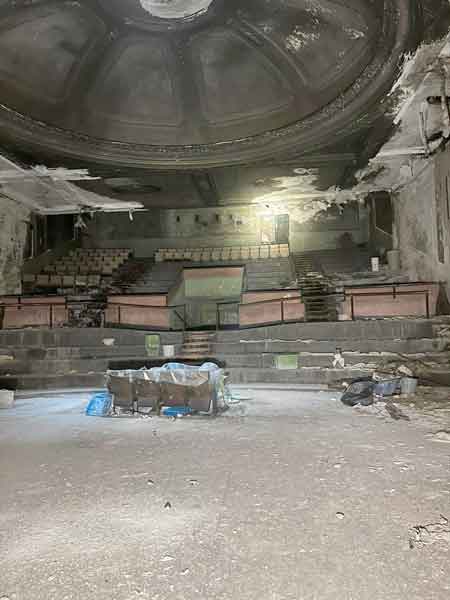
Click image to enlarge.
View from stage into seating area.
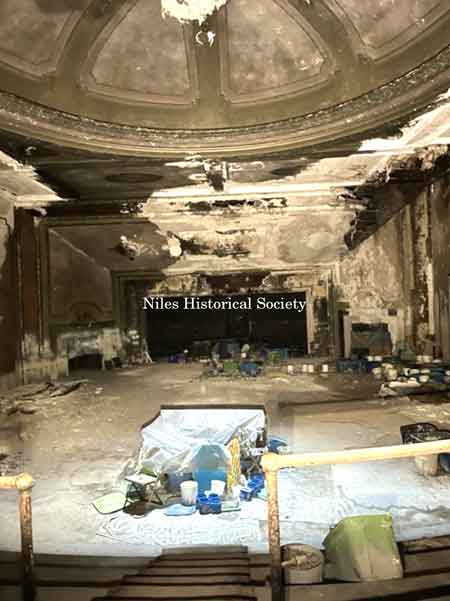
View from seating area to stage.
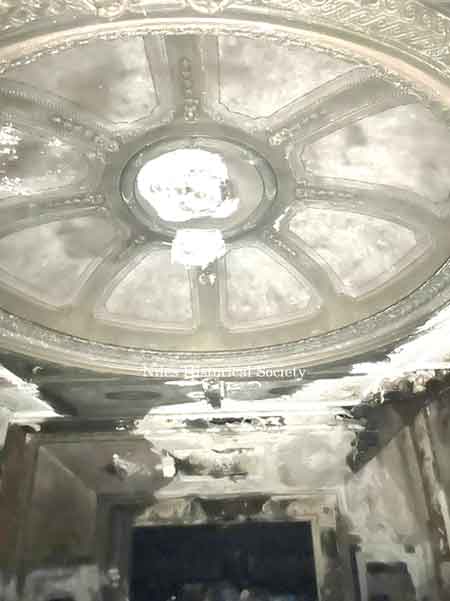
View of ceiling rotundra.
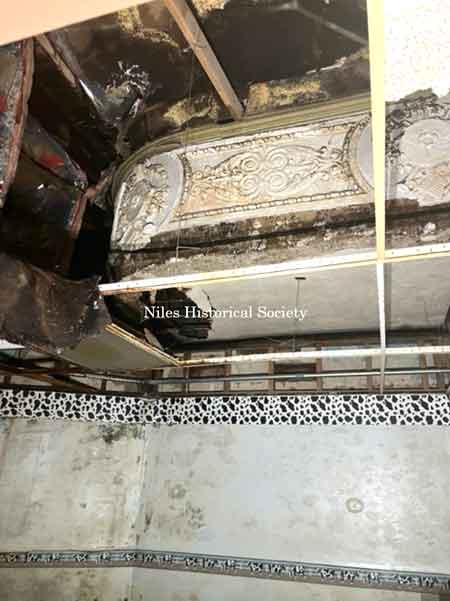
View of balcony.
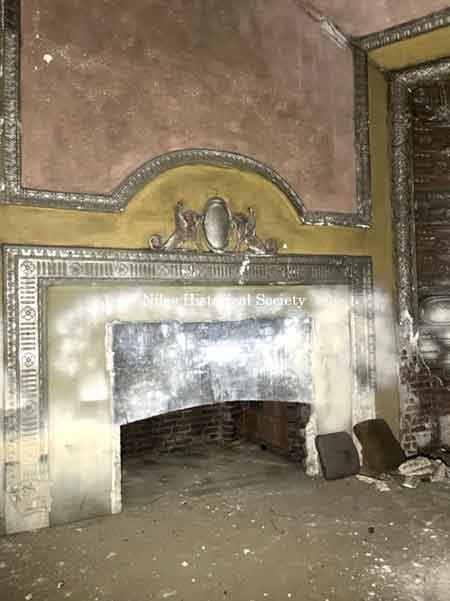
View of fireplace. |
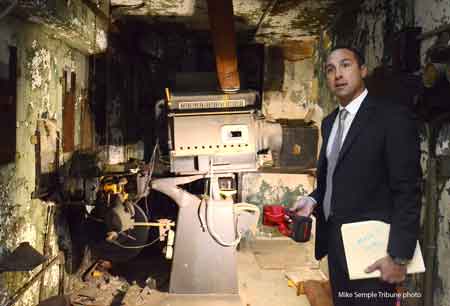 Warren
Tribune Chronicle, October 29, 2023 with permission. Warren
Tribune Chronicle, October 29, 2023 with permission.
NILES — Walking through the vacant building
on South Main Street downtown, Mayor Steve Mientkiewicz,
flashlight in hand, carefully navigated through the remnants of
what once were offices. But, as the cool, late October breeze
blew through several holes that expose the building to the outdoor
elements, the offices no longer looked like places of work, but
rather areas left behind in an apocalyptic scene. A stench of
dampness filled the building. The rooms were lined with buckets
and water seemed to drip continuously from the ceiling. Sections
of the walls were covered in mold. Floors that once were carpeted
now had only a brown muck remaining.“The water infiltration
is unbelievable,” Mientkiewicz said. “Even now, it
hasn’t rained for a few days, you’ll still be able
to hear dripping.”Whether it be the scattered office rooms
or plaster melting off the walls, anyone journeying through the
building would never know they were walking around what once was
the first-level seating of the old Niles Theater Building.“When
people talk about renovating it, there’s no theater anymore,”
Mientkiewicz said.
The theater, which opened in the 1930s, has sat
mostly empty and deteriorating for several years. Now owned by
Niles, the city has begun the process of demolishing the building.
Asbestos abatement has begun on the theater building, along with
the old Reisman’s Furniture store next to it. They will
be torn down in the coming weeks. The contractor completing the
demolition is Dore & Associates Contracting Inc. based out
of Bay City, Michigan. As some residents have questioned why the
city did not attempt to salvage the building, Mientkiewicz said
that was not a realistic option.“The city is not in the
theater business,” Mientkiewicz said. “We would encourage
private development or public-private partnerships, but there’s
a reason why for 60-plus years, this building sat idle and vacant.
I’m assuming, private developers said ‘absolutely
not,’ due to its condition of it and the money they’d
have to spend rehabbing it.”
HISTORY
At one point, the building was home to one of
the best theaters in the city. In 2022, when Niles officials began
seeking grants for the demolition, Ralph Tolbert, a member
of the Niles Historical Society said “It was considered
the best theater and showed premiere movies.” At one time,
the stretch of buildings contained not only the theater and Reisman’s
Store, but also Ward’s Costume Shop, a tattoo shop, offices
for the Ohio Bureau of Employment Services, and a pool hall among
other things. Attorney Curt Bogen had offices in the
building. Tolbert said the upper balcony was large and hung over
the lower level of the theater. He said there was a large movie
screen and families went there on Saturday afternoons for children’s
specials. Tolbert said following the Great Depression, many people
liked going to the movies. He said the theater was popular from
the 1930s through the 1950s before closing in the 1960s.
In the 1970s, while the Ohio Bureau of Employment
Services had offices in the building, the first floor had wooden
framing installed to level the original sloped floor. Mientkiewicz
said he was told that in the 1980s, former city auditor Phil
Rickard owned the building and used it as a haunted house.
Mientkiewicz said the demolition is being completed with a grant
through Ohio’s Demolition and Site Revitalization Program.
He added the grant went through the Trumbull Neighborhood Partnership,
which received over $7 million for various county projects. He
said the city had to provide a 25% grant match for the demolition.
According to the Trumbull County Auditor website, on Jan. 1, 1990,
the properties at 42 through 46 South Main Street in Niles were
sold by an unknown seller to Reismans Inc. The listed sale price
was $0. Then, on July 31, 2023, Reismans Inc. sold the properties
to the city of Niles for $0.
THE THEATER
When Niles officials were given the keys to the
building, Mientkiewicz, along with other Niles officials, surveyed
the building, searching for any remnants of the actual theater.
“I said ‘Where is the theater?’ and they said
‘This was it,'” Mientkiewicz said. “We were
looking around to try to get upstairs to the balcony and couldn’t
find it.” Eventually, the city officials found the stairwell
to the balcony. It was behind a closed door, sealed with metal
rods and covered with a tarp. At the top of the stairwell sat
a secondary lobby, complete with restrooms and a carpeted ramp
which led up to a room filled with complete darkness and no remaining
electricity. “When we were first walking through here, not
knowing where the theater room was or how to get there or what
to expect, when we walked up the ramp and shined the light into
the actual theater room, it was like finding the lost city of
Atlantis,” Mientkiewicz said.
Climbing the ramp into the dark room, the mayor’s
flashlight illuminated the clearest picture of what the Niles
Theater used to look like — at least half of it. Stretching
from the end of the balcony level across to about the middle of
where the stage and screen used to be, a floor was installed directly
on top of the offices below. Whereas on the ground level, all
remnants of the theater had been erased, on the balcony level,
an outline of the theater was still distinguishable.
The stage / screen area, with fireplaces on each
side, still stood out at the front of the room, though cut in
half. Intricate designs could still be seen on parts of the walls
though most were worn down or faded. Looking upward, the room
was capped with a rotunda-style ceiling. In the middle of the
ceiling was a gaping hole that has existed since ‘however
old the Google Earth images show,” Mientkiewicz said.
Below the hole, a tarp along with several buckets
and old coffee canisters were placed in an attempt to catch some
of the water that falls into the building when it rains. “With
the water damage and deterioration, the architecture, the plaster
and the intricacy is all wiped away,” Mientkiewicz said.
The mayor said there was some evidence that a previous owner had
attempted to rehabilitate the theater. The effort was to no avail.
“You can tell that people actually tried to clean this up
at one point in the 1980s or 1990s,” Mientkiewicz said.
“The previous owner on the Trumbull County auditor’s
website goes back to 1990, so we’re not sure if that’s
when the previous owner took ownership of the building and tried
to do something, but there was an attempt to restore it to some
degree. Then, it’s my assumption that they finally just
realized it was way too costly and there was not a return on their
investment, so they just stopped.” The remnants of the theater
room have acted as an attic for the offices below for decades.
RELICS
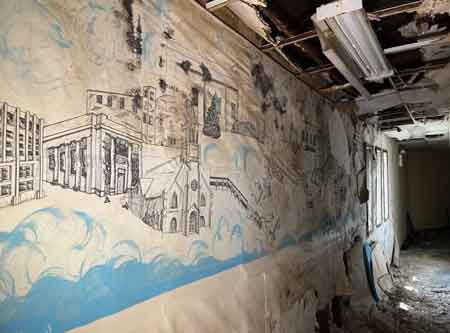 While
the theater building will be completely removed during demolition,
some of its history was able to be preserved. At the top of the
theater, several wooden chairs and sections of the original carpet
were still intact and able to be saved. In the projector room,
several film canisters were left, though what movies they contained
was undeterminable. The largest relics the city has been able
to save are two gas-powered film projectors, both of which had
exhaust pipes sticking out of holes in the building. Audra
Dull, the public services manager at the McKinley Memorial
Library, said one of the projectors, along with a few other artifacts,
were acquired by the library and are on display at the McKinley
Birth Home. “We are going to have on display a projector
and some seats from that theater,” Dull said. ‘They
will be cleaned up, but they will still be all original.”
Dull said preserving local history is important. She said the
library looks to partner with the Niles Historical Society and
other entities to keep the legacy of the city intact. Mural was
drawn by Mario Bertolini, a Niles Art teacher. While
the theater building will be completely removed during demolition,
some of its history was able to be preserved. At the top of the
theater, several wooden chairs and sections of the original carpet
were still intact and able to be saved. In the projector room,
several film canisters were left, though what movies they contained
was undeterminable. The largest relics the city has been able
to save are two gas-powered film projectors, both of which had
exhaust pipes sticking out of holes in the building. Audra
Dull, the public services manager at the McKinley Memorial
Library, said one of the projectors, along with a few other artifacts,
were acquired by the library and are on display at the McKinley
Birth Home. “We are going to have on display a projector
and some seats from that theater,” Dull said. ‘They
will be cleaned up, but they will still be all original.”
Dull said preserving local history is important. She said the
library looks to partner with the Niles Historical Society and
other entities to keep the legacy of the city intact. Mural was
drawn by Mario Bertolini, a Niles Art teacher.
“At the McKinley Memorial Library we certainly
understand the importance of Niles history,” Dull said.
“We really appreciate the good work that the Niles Historical
Society is doing as far as preserving our local history and we
partner with them whenever we’re able. As a matter of fact,
the artifacts will be on display at the McKinley Birthplace Home,
and when that display is over, the artifacts will be donated to
the Niles Historical Society.” Mientkiewicz said the city
is open to discussing a similar agreement regarding the other
projector. “The Tyler (History Center) in Youngstown, if
they’re interested, they’re more than welcome to it
before the demolition,” he said.
AFTER DEMOLITION
Mientkiewicz said that the city will retain the
property once demolition has finished and city council will have
discussions with Niles CIC to see what’s next. “We’ll
try to look towards some sort of redevelopment with a site-ready
piece of land,” he said. The available space could be used
as an urban entertainment area, which is a factor discussed in
the city’s comprehensive plan. “We’re pretty
excited about not only taking this down but also having some plans
in place as to what this could become,” he said. Down one
decrepit hallway of the theater building, a mural showing many
historical sites of the city stretched across a white wall. Mientkiewicz
said the artist was unknown. The mural contained images of a Niles
Firebrick Company plant and the Niles Times Building, both of
which have since receded into city history.
In the coming weeks, the remnants of the theater
building and the old Reisman’s Furniture store will join
them. |
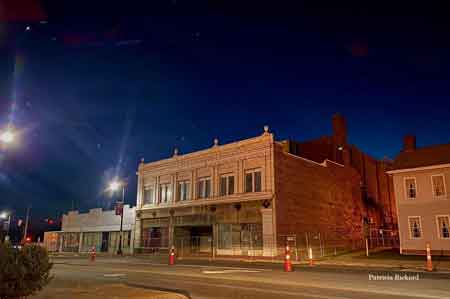
Click image to enlarge.
Reisman's, Robins Theater and the
McKinley Research Center are shown in this photo.
Photo: Patricia Rickard, October 25, 2023
In late October 2023 the two corner
buildings, Reisman's and the Robins Theater, were cordoned off
prior to their demolition.
Previously, these
buildings housed The Style Shoppe, Loblaws Market, Butler Soda
Grille, Dunnigan's Photography, a ceramic shop, Ward’s Costume
Shop, a tattoo shop, offices for the Ohio Bureau of Employment
Services, and a pool hall and various other downtown businesses.
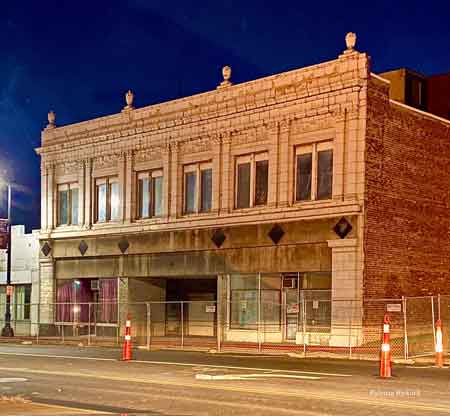
Click image to enlarge. |
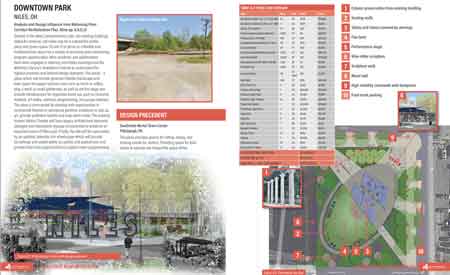
Click image to enlarge.
Studied in the Niles Comprehensive
plan, the existing buildings, slated for removal, will make way
for a substantial public plaza and green space. Its aim is to
serve as a flexible and multifunctional space for a variety of
enriching and entertaining program oppor-tunities. Niles residents
and stakeholders have been engaged in steering committee meetings
and the McKinley Library’s Strawberry Festival to understand
the highest priorities and favored design elements.
The result – a plaza which
will include generous flexible hardscape and lawn space to support
passive uses such as lunch or coffee,
play, a stroll, or small gatherings, as well as set the stage
and provide infrastructure for organized event use such as concerts,
markets, art walks, wellness programming, and group meetups.
The plaza is surrounded by planting
with opportunities to incorporate themed or sponsored gardens,
sculptural art, provide pollinator habitat and treat storm water.
The existing historic Robins Theater
will have legacy architectural elements salvaged and interpretive
signage incorporated to preserve an important piece of Niles past.
Finally, the site will be surrounded
by an updated, amenity rich streetscape which will provide furnishings
and added safety to cyclists and pedestrians, and provide food
truck opportunities to support event programming. |

Click image to enlarge.
The Niles downtown launch proposed
site leverages a wellconnected parcel to strengthen both physical
connections and environmental awareness at the riverfront site
just below
South Main Street bridge into downtown.
Working with the existing topography
to maintain least disturbance to the riparian buffer, the plan
proposes to utilizes an existing gravel road for watercraft launch
with a small riverfront park zone adjacent. A small dock provides
opportunity for an accessible launch.
Turnarounds, pull-offs and parking
allows for efficient ramp use for individuals and groups. Working
with the existing grade, an amphitheater and environmental education
center is proposed on the site’s western portion. Pursuant
to the river corridor
plan, the education center would house park facilities and infrastructure,
but also be an opportune host for nearby school programming about
the river’s environment, history, and the nearby wetlands
for which a trailhead and trail connections have been provided. |


